A tailor’s workshop on the Turkish coast, a petrol station near Greece’s border with Macedonia, an unemployed woman’s flat. What do they have in common?
They are unofficial headquarters along the 2,000-mile refugee trail staffed by volunteers who cannot stand by as Europe’s biggest refugee crisis since the second world war unfolds.
Young and old, ideological and humanitarian, left and right, these are people often with little in common except their desire to make a difference when human suffering is tangible – and treatable.
In Izmir, a city on the coast of Turkey, the tailor and shoemaker Yalçın Yanik cuts soles in his workshop. The 73-year-old Afro Turk, a descendant of Ottoman slaves from Africa who has founded an informal association of trade unions, spends his days collecting and distributing donations, trying to find work for Syrian tailors and organising protests and rallies. Only in the early morning and evening does he manage to do his tailoring work, and he has not had time for dinner with his family in years.
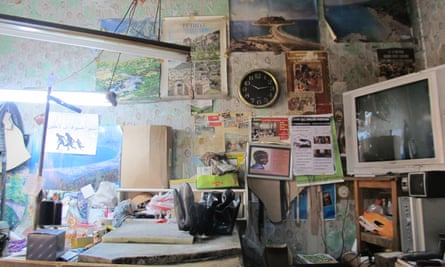
His neighbourhood, Basmane, is home to about 100,000 Syrians – and the smuggling mafia. “Once, there were police officers here asking me if I was a smuggler. I asked them: ‘Are you kidding me?’” Racism against Syrians is widespread in Turkey. Even among leftwingers, the notion prevails that Turkey has enough problems of its own and Syrians should go back and fight for their country. Yanik has a different view. “It’s not about Syrians or Turks – it’s about working conditions.” Fewer than 0.1% of Syrians have been allowed to apply for a work permit, and those forced to work illegally drive down wages. A few miles west, Güray Yalvaçlı turns his car towards a small hill to get a good view of the beach from where boats cast off. The shore is deserted, with an air pump the only sign of activity. The sea is rough today, the Aegean island of Chios only dimly visible on the other side. “That’s where international waters begin,” says Yalvaçlı, pointing to the sea. Sometimes, people in inflatable boats jump into the water in a vain attempt to escape the Turkish coastguard. “The police or the coastguard call me and tell me what they need – food and liquids, dry clothes. We come and give them what they need,” explains Yalvaçlı, the founder of a 20-strong volunteer organisation called İmece, based in the resort of Çeşme, 55 miles from Izmir.
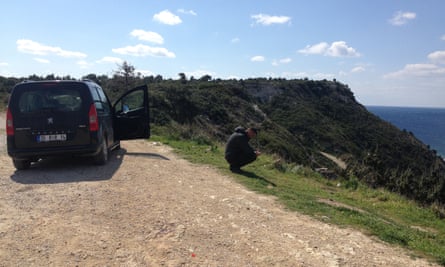
There have been fewer refugees since the EU-Turkey deal, which stipulates that those arriving in Greece must be sent back to Turkey. Yet there will always be those desperate enough to take the risk.
Four times a day, Yalvaçlı drives along the same route to check the refugees’ hiding places – but only between 8am and 8pm. The boats usually set off after sundown. Asked why his team don’t come after dark, Yalvaçlı shrugs. “The mafia have weapons – I can’t just show up, not just like that.” On his daily patrols, though, he can help people avoid extortionate taxi fares by taking them to hospital in emergencies. Today Yalvaçlı makes phone calls in his car for a woman without a passport who has gone into labour. He is committing a crime by transporting refugees for smuggling purposes, but the police turn a blind eye in the same way that he ignores the corruption between them and the smugglers.
The next morning, an exhausted Yalvaçlı sits smoking under the awning of his cafe, the meeting point for İmece. He is hunched over his mobile phone: Turkish aid workers remain in constant contact with one another and with volunteers in Chios. “Tonight,” they may write, when they find out groups are getting ready to move. “Thanks” is the brief response from those such as Toula Pothiti.
Pothiti coordinates the Chios eastern Shore Response Team (CESRT) across the sea. She has come to Izmir for a decent night’s rest. For now, though, she’s taking a walk through Basmane, where she rubs her fingers against a child’s lifejacket being sold on the street. It is pink, decorated with a cartoon princess, and scarcely thicker than a pair of water wings. Pothiti clicks her tongue in disgust. “Where is the fucking EU?” she asks and walks on.
In a side street sits a family from Aleppo, waiting with black plastic sacks in which they have hidden their lifejackets from the gaze of the police. Six adults and 10 children are here, including a baby being breastfed by its mother. They have been sleeping rough for two nights; the youngest girl is pale and listless. Pothiti lays her hand on the girl’s forehead. “She’s running a fever,” she says, and goes to buy medicine at a pharmacy. Then the smuggler turns up – it’s time to go. Pothiti kisses the girl on the forehead.
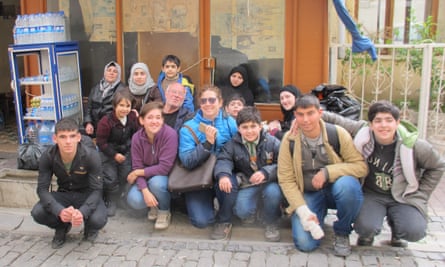
Back home at her hotel in Chios, Pothiti rents out rooms to volunteers at a special rate, and uses her flat inside the hotel as the base for CESRT. Seventy per cent of the island’s tourism industry has collapsed since the refugees started arriving, but the local population has shown its readiness to help. “I remember the first time one of the boats arrived on our beach,” recalls Pothiti. “People started yelling: ‘Refugees!’ So I went. Lots of children were crying. That was the moment I realised we had to do something.”
Pothiti’s decision to take action is typical of how most volunteers get involved. Frequently, they will have been thinking for weeks or months about helping before something galvanises them: a television report, a Facebook post, a friend’s question. The extent to which this moment will change their lives will not be immediately apparent. Pothiti soon found herself dedicating all her time to refugees. Her relationship ended as a result. She hasn’t been alone with her nine-year-old son for weeks. “He’s always saying: ‘Mum, turn off your phone.’ And I tell him: ‘But we have to help the children.’ ‘I’m your child,’ he tells me – and he’s right,” she says.
Why do volunteers give up so much? “We are happy,” says Pothiti “because we do something good.” But there is more to it. The feeling of being needed and the gratitude of refugees are rewarding. Young volunteers from all over the world come for an experience that wealthy societies don’t provide: a reduction to the essentials. They can be independent, have responsibilities and do meaningful work, with a dash of adventure and no time to fret over what to wear or where to eat. More than anything, it’s a chance to be part of a community that shares the same ideals.
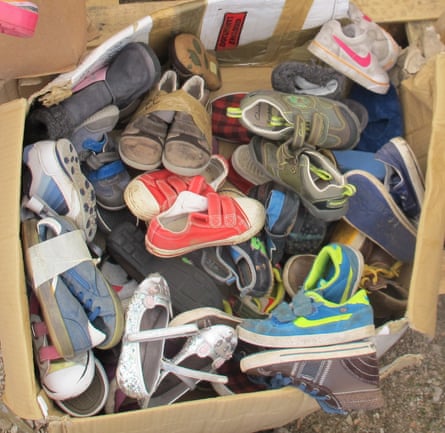
Yet there is a big difference between foreign volunteers and local helpers: the former can choose the degree and duration of their involvement, while the latter have to find a way to keep going long term. Pothiti is working to have her team registered as an NGO so it can accept larger financial donations from abroad. Private gifts are difficult to anticipate. One week, €2,500 may come in; other weeks much less. Good coordination is required: donations have to be sorted and distributed; refugees’ wet clothes need washing and drying; up to 2,000 meals need preparing three times a day, a job formerly left to volunteers. At night people keep watch in shifts from a dozen vantage points, using phone apps to keep tabs on the weather. A central phone line is manned 24/7. New helpers are trained, including learning levels of hypothermia. Everyone finds their place, depending on their skills and wishes, doing everything from emergency sea rescues to collecting rubbish from the beaches.
Captain Borja, who runs a Basque sea rescue team, views his work pragmatically: “I help these people reach land even if the police arrest them later. When I’m out there, I only have one job: get the people out of the water.”
**
Aisha Kalaily (not her real name) zooms across Chios in her car with the window down and radio blaring. The 19-year-old Palestinian was questioned for three hours by police back home in Jerusalem after returning from her first aid mission. They wanted to know whether she had discussed politics. Kalaily’s father had been afraid for her safety. Still, she has returned to Chios, where she cannot stop thinking about a dead baby she saw arriving on the shore in February. The parents had run out of money for food in Turkey and the undernourished six-month-old did not survive the boat journey. Kalaily keeps visiting the grave and praying for the child. “At home, I feel useless,” she says.
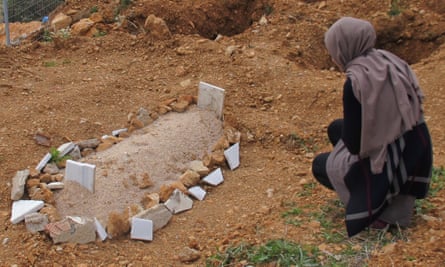
Beside her in her car now sits a pregnant Syrian woman whom Kalaily is driving from a camp to see her husband in hospital where he has been for four days, bedridden with a broken vertebra in his neck and heart problems linked to high blood pressure. No one has been able to communicate with him during his stay, explains Kalaily, since the doctors speak neither English nor Arabic. She looks after the EVIs – extremely vulnerable individuals – spending most of her time translating.
“He has to go. We don’t have any beds left. Make sure he doesn’t eat too much salt,” a Greek nurse says to her, as the Syrian is transferred to an ambulance, his face distorted with pain. Back at Camp Souda with the patient, Kalaily begins to cry. “If there’s no room here, I’ll take him home with me,” she snaps at one of the camp’s first-aid workers. “That’s not how it works,” comes the blunt reply. “There are procedures for registration. You can’t just drop people off. This isn’t some competition to see who can be the better helper.”
In Athens, Thomai Tomatis has ridden home on her scooter, swerving to avoid a dead pigeon. “Bashar sleeps over here; Rania and I sleep over there on the couch. I’ll make the bed later,” she says. For the past two months, Tomatis has been volunteering at Piraeus harbour, where thousands of people have been waiting. Among them was Bashar al-Mohamad who, because of his good English, quickly became a helper himself. He got to know Tomatis at the donation centre and she offered him a place to stay in the small flat she shares with her girlfriend, Raina.
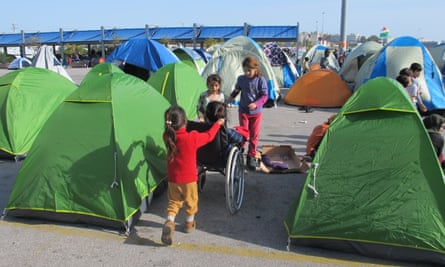
Tomatis has been pitching in at the camp in Piraeus, but with the Greek authorities seemingly determined to clear the space her focus is switching. Now she will organise accommodation for Afghans in Athens’s anarchist district of Exarchia. There’s always something to be done.
Other volunteers move on to Idomeni, where there is no end in sight to the humanitarian crisis. Near the fence on the Macedonian border, unofficial camps have popped up, like the one sheltering 2,000 people at the EKO petrol station at Polykastro. Nadira Babji, a 24-year-old doctor from Malaysia, has been volunteering here for six months. Today, she is running the medical tent of Médecins Sans Frontières with a team from the non-profit MedVint group. An asthmatic woman can’t breathe because of the smoke from open fires; a little girl has passed out from fever; for a man with an injured spinal cord, the mere movement of his big toes makes him wail.
“The most difficult part of my job is when I have to tell people I can’t do anything more for them,” says Babji that evening at the Park Hotel, a volunteer contact and infrastructure point. Soup kitchens have been set up next to the terrace, where spirits are high. “Yes! We got the donations,” a young German woman posts on Facebook. “Tonight, we’ll be able to have a decent meal!” Computers and smartphones charge on plug bars. Some volunteers are reading the daily news digest by Are You Syrious?, a Zagreb-based aid group that has put together an international team of reporters. A few Spanish volunteers are playing Bob Marley on guitar while Babji drums along on the table.
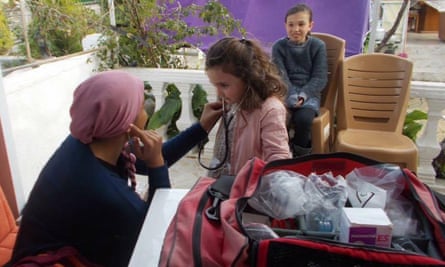
Babji is the eldest of six children and used to responsibility. Her mother still hopes she will build a career and get married but even at university, she says, it was clear she wanted to volunteer. “I want to see the world and I want to help,” she adds, smiling. Before Idomeni she was in Torbalı near Izmir, an informal camp where Syrian Bedouins worked in local fields. When Babji arrived with her team it was the first time for weeks the refugees could get medical aid. She likes connecting with people, she says. “I saw people coming for three days. What can you achieve in such a short time? That’s voluntourism.”
Now in Idomeni she talks critically about anarchist groups from Greece, Spain and Italy. “They’re just pursuing their own goals. They challenge the refugees to storm the fences. The refugees are desperate, so of course they go along with it. At the end, the activists are detained at the police station for 12 hours and pay €25. But the refugees drown in the river or are beaten by the police. I took care of someone today whose arm was covered in bruises. That’s seriously fucked up. The activists are exploiting people for their own agenda.”
Some international volunteers prefer having their pictures taken holding babies to collecting rubbish. Even so, they are additional sets of eyes and ears, witnesses to events. Something is growing that is bigger than the sum of individual moments. Once you start helping, you can’t stop – maybe because going home is more difficult than heading into the fray. Anyone who has seen their help is needed can no longer turn their back on the responsibility, becoming more politically aware in the process. There’s no turning back.
**
When she got to Calais last September, Dani Lawrence from north London met a boy who, at 15, was just a year older than her own daughter. “He told me how the boat he was travelling on between Turkey and Lesbos began to sink and they began throwing single people into the water,” says Lawrence. “He said he linked arms with another boy and told him ‘We’re brothers, we’re brothers’ so that they would not throw them off. He was alone.”
She told him she had driven over from the UK with goods and clothes and asked him what he needed. “He looked at me and he started crying and he said: ‘I don’t want anything. I just want my mum.’”
His journey had echoes of her own father Leon’s escape from Morocco at the age of 17 in the 1960s. He had left in the middle of the night in a little boat, smuggled across the sea to Gibraltar by Jewish organisations in Casablanca.
Lawrence contrasts the welcome her father received, at a large refugee camp in Marseille, with the dire situation faced by many of the unaccompanied children in the Calais camp, and tells of her astonishment at the lack of large organisations. “Back in London, when my husband opened the door, I broke down. I said: ‘We can’t stop now. We can’t just give them stuff. We need to help.’”
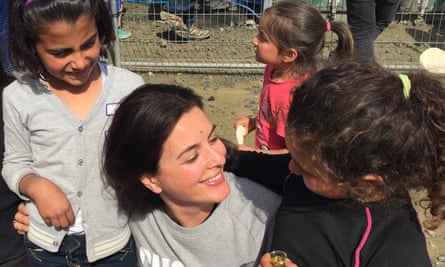
The French-born graduate in French and Spanish says: “I’ve never run a charity. I’ve never travelled to war zones or visited refugee camps in the past. But as a mother, as a human being, I can’t stand by. People need dignity and self-worth. I know it sounds like a cliche but I talk from the heart. There are so many children who need help. I can’t imagine my own children going through this.”
Eight months later, Lawrence is still volunteering with Help Refugees, doing everything from fundraising to translating work. Along with the French organisation L’Auberge Des Migrants, the charity set up a massive warehouse outside Calais, which stores and distributes goods to the camp. It now has a volunteer-staffed community kitchen, cooking meals for some of the estimated 6,000 refugees in Calais and Dunkirk.
Asked how her family’s toiletry business and her own three children have managed without her over the past eight months, Lawrence says: “I’m very lucky. I have an incredible husband who understands what I’m doing. I did the accounts and paperwork, which he has now taken over. He has had to work harder and he helps more with the children. He doesn’t cook but he can make pasta. He will say: ‘You do what you need to do.’ He feels like he is helping refugees by helping me.”
Lawrence works around her family life. “I drop the kids at school. I do homework with them every evening. I can be in the playground and I’ll get an email and I can deal with it there and then. If I go to Calais, I can be back in a day. My son Sam asked me on Saturday: ‘Mummy, how old do you have to be before you can volunteer?’ It’s incredible going there, seeing shelters we helped build. We sometimes say we can help people help. I’m very proud of the public. They have given me faith in human nature.”
**
Nadira Babji is now in Istanbul. Thomai and Rania are in Thessaloniki. Bashar is sleeping at the harbour once again. Borja is in Spain planning his next mission. Their journeys are crisscrossed by thousands of others: Franziska from Germany is back in Dresden. Kanwar from London is in Jordan. Mattias has gone home to Gothenburg, and says he can only shake his head when he sees his children squabbling over an iPhone. Veronica has gone back to Mexico because her visa expired. Ali is in Torbalı.
Translation by Charles Minnick
This piece was made possible by a scholarship from the Robert Bosch Stiftung. Juliane Löffler is an editor at Der Freitag.
This piece is part of our Half-full series. If you have suggestions of stories, trends, innovations and people that you’d like to see included in this series please share them in the form below.
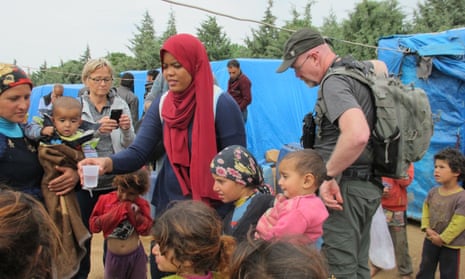
Comments (…)
Sign in or create your Guardian account to join the discussion